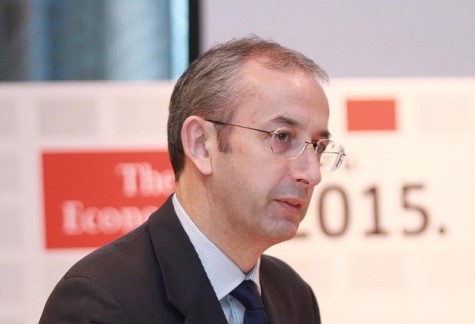The year 2015 will be challenging for both the EU and Serbia in economic terms, but EU remains main Serbia’s trading partner and donnor. Through a new EU approach on economic governance in candidate countries, Serbia will get concrete policy advice, so 2015 will be a pilot year for this new process, the Head of the EU Delegation to Serbia Michael Davenport said.
“Almost two third of total Serbian exchange in goods is carried out with the EU. Russia’s share in Serbia’s overall trade is less than 10 percent, while the share of China is 4.4 percent, Turkey 2.2percent and USA 1.6percent,” Davenport told the conference “The Economist: The World in 2015.”
He recalled that exports from Serbia to Italy or Germany alone were “significantly higher than Serbia’s exports to Russia, China, Turkey and USA combined.”
“The EU is also by far the biggest investor in Serbia. It invested €13.5 billion in Serbia since 2005, which represents 76.5 percent of all Serbia’s FDI (foreign direct investment),” Davenport said and added that the EU is the biggest donor in Serbia too.
Without individual grants by Member States, the EU “granted €2.6 billion in various projects since 2000 to today,” he said, adding that even more important is that these EU support grants have led to additional business investments.
“Examples include the EU PROGRES project establishing a technology park in Vranje leading to the GEOX investment from Italy and 1,200 new jobs created, as well as the business and technology park in Indjija in which the German healthcare firm Fresenius has just started its operations.”
“We will continue to assist Serbia in its efforts to create a more stable business environment by adopting consistent and modern laws, which are properly implemented and enforced,” the EU ambassador said.
Davenport said a new EU approach on economic governance “will help accession countries like Serbia obtain concrete policy advice, often going beyond the EU acquis.”
“The Commission is fully aware that this new process is challenging as it requires close coordination within Government institutions and a wide consultation of relevant stakeholders such as social partners, the private sector and civil society. 2015 is however considered to be a pilot year,” Davenport said.
“We cannot expect miracles for 2015 in terms of economic growth. However, I am confident that with the ongoing processes I have just described, both the EU and Serbia are better prepared to benefit from the expected – albeit modest – upturn of the global economy in 2015,” the EU ambassador said.




